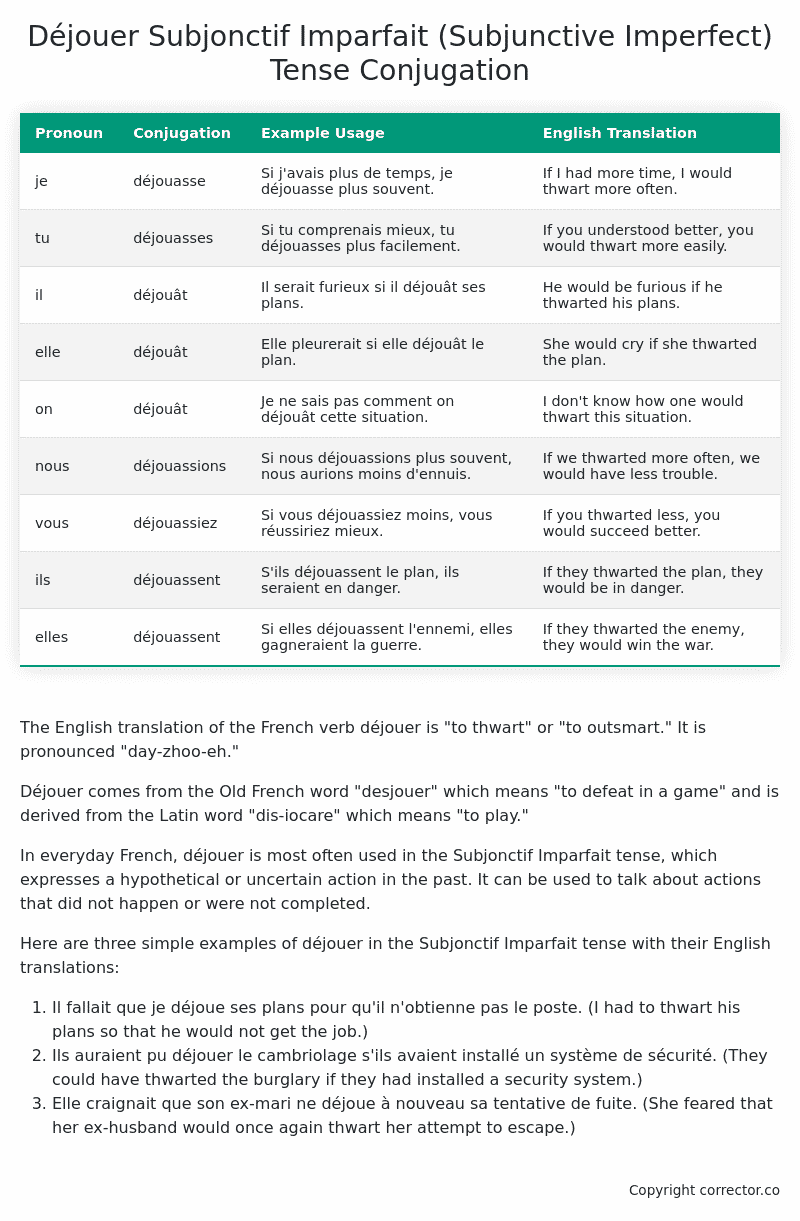Subjonctif Imparfait (Subjunctive Imperfect) Tense Conjugation of the French Verb déjouer
Introduction to the verb déjouer
The English translation of the French verb déjouer is “to thwart” or “to outsmart.” It is pronounced “day-zhoo-eh.”
Déjouer comes from the Old French word “desjouer” which means “to defeat in a game” and is derived from the Latin word “dis-iocare” which means “to play.”
In everyday French, déjouer is most often used in the Subjonctif Imparfait tense, which expresses a hypothetical or uncertain action in the past. It can be used to talk about actions that did not happen or were not completed.
Here are three simple examples of déjouer in the Subjonctif Imparfait tense with their English translations:
- Il fallait que je déjoue ses plans pour qu’il n’obtienne pas le poste. (I had to thwart his plans so that he would not get the job.)
- Ils auraient pu déjouer le cambriolage s’ils avaient installé un système de sécurité. (They could have thwarted the burglary if they had installed a security system.)
- Elle craignait que son ex-mari ne déjoue à nouveau sa tentative de fuite. (She feared that her ex-husband would once again thwart her attempt to escape.)
Table of the Subjonctif Imparfait (Subjunctive Imperfect) Tense Conjugation of déjouer
| Pronoun | Conjugation | Example Usage | English Translation |
|---|---|---|---|
| je | déjouasse | Si j’avais plus de temps, je déjouasse plus souvent. | If I had more time, I would thwart more often. |
| tu | déjouasses | Si tu comprenais mieux, tu déjouasses plus facilement. | If you understood better, you would thwart more easily. |
| il | déjouât | Il serait furieux si il déjouât ses plans. | He would be furious if he thwarted his plans. |
| elle | déjouât | Elle pleurerait si elle déjouât le plan. | She would cry if she thwarted the plan. |
| on | déjouât | Je ne sais pas comment on déjouât cette situation. | I don’t know how one would thwart this situation. |
| nous | déjouassions | Si nous déjouassions plus souvent, nous aurions moins d’ennuis. | If we thwarted more often, we would have less trouble. |
| vous | déjouassiez | Si vous déjouassiez moins, vous réussiriez mieux. | If you thwarted less, you would succeed better. |
| ils | déjouassent | S’ils déjouassent le plan, ils seraient en danger. | If they thwarted the plan, they would be in danger. |
| elles | déjouassent | Si elles déjouassent l’ennemi, elles gagneraient la guerre. | If they thwarted the enemy, they would win the war. |
Other Conjugations for Déjouer.
Le Present (Present Tense) Conjugation of the French Verb déjouer
Imparfait (Imperfect) Tense Conjugation of the French Verb déjouer
Passé Simple (Simple Past) Tense Conjugation of the French Verb déjouer
Passé Composé (Present Perfect) Tense Conjugation of the French Verb déjouer
Futur Simple (Simple Future) Tense Conjugation of the French Verb déjouer
Futur Proche (Near Future) Tense Conjugation of the French Verb déjouer
Plus-que-parfait (Pluperfect) Tense Conjugation of the French Verb déjouer
Passé Antérieur (Past Anterior) Tense Conjugation of the French Verb déjouer
Futur Antérieur (Future Anterior) Tense Conjugation of the French Verb déjouer
Subjonctif Présent (Subjunctive Present) Tense Conjugation of the French Verb déjouer
Subjonctif Passé (Subjunctive Past) Tense Conjugation of the French Verb déjouer
Subjonctif Imparfait (Subjunctive Imperfect) Tense Conjugation of the French Verb déjouer (this article)
Subjonctif Plus-que-parfait (Subjunctive Pluperfect) Tense Conjugation of the French Verb déjouer
Conditionnel Présent (Conditional Present) Tense Conjugation of the French Verb déjouer
Conditionnel Passé (Conditional Past) Tense Conjugation of the French Verb déjouer
L’impératif Présent (Imperative Present) Tense Conjugation of the French Verb déjouer
L’infinitif Présent (Infinitive Present) Tense Conjugation of the French Verb déjouer
Struggling with French verbs or the language in general? Why not use our free French Grammar Checker – no registration required!
Get a FREE Download Study Sheet of this Conjugation 🔥
Simply right click the image below, click “save image” and get your free reference for the déjouer Subjonctif Imparfait tense conjugation!

Déjouer – About the French Subjonctif Imparfait (Subjunctive Imperfect) Tense
Formation
Common Everyday Usage Patterns
Interactions with Other Tenses
Subjonctif Présent
Indicatif Passé Composé
Conditional
Conditional Perfect
Summary
I hope you enjoyed this article on the verb déjouer. Still in a learning mood? Check out another TOTALLY random French verb conjugation!


